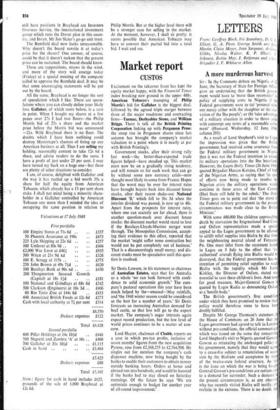CUSTOS
Market report
Excitement on the takeover front has kept the equity market happy, with the Financial Times index breaking new ground in the upper 480s. American Tobacco's trumping of Philip Morris's bid for Gallaher is the biggest deal; followed by the agreed triple merger between three of the major roadstone and contracting firms—Tarmac, Derbyshire Stone, and William Briggs. There is talk of the British Printing Corporation linking up with Pergamon Press: the steep rise in Pergamon shares since last autumn has brought the company's market valuation to a point where it is nearly at par with British Printing's.
Government stocks, after their strong rally last week—the better-than-expected trade figures helped—have steadied up. This market must now be on a gradually rising tendency, and will remain so for each week that can go by without some new currency crisis—now thought most likely to come from France. Hopes that the worst may be over for interest rates have brought buyers back into discount house stocks, after their recent shake-out. National Discount 'B,' which fell to 36s 3d when the interim dividend was passed, is now up to 40s. Apart from the prospects for interest rates, where one can scarcely see far ahead, there is another question-mark over discount house stocks: the discount market would stand to lose if the Barclays-Lloyds-Martins merger went through. The Monopolies Commission, accept- ing their evidence to this effect, reported that the market 'might suffer some contraction but would not be put completely out of business.' That is a disconcertingly small mercy; and dis- count stocks must be speculative until this ques- tion is resolved.
Sir Denis Lowson, in his statement as chairman of Australian Estates, says that for Australia as a whole 'we can look forward with confi- dence to solid economic growth.' The com- pany's pastoral operations this year have been much helped by the—unusual—May rainfalls, and `the 1968 winter season could be considered as the best for a number of years.' Sir Denis forecasts an increasing Australian demand for beef cattle, so that less will go to the export market. The company's sugar interests again expect record production, but the low level of world prices continues to be a matter of con- cern.
Lord Hayter, chairman of Chubb, reports on a year in which pre-tax profits, inclusive of seven months' figures from the new acquisition Pyrene, rose from £2,368,255 to £2,764,508. He singles out for mention the company's cash dispenser machine, now being bought by the banks to enable their customers to obtain money outside banking hours. Orders at home and abroad run into hundreds, and would be boosted if the banks had to stay closed on Saturday mornings. Of the future he says 'We are optimistic enough to budget for another year of all-round improvement.'






































 Previous page
Previous page